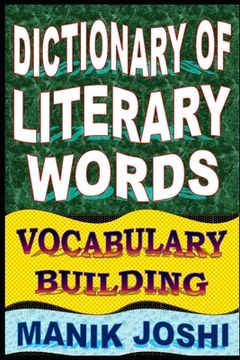Synopsis "Dictionary of Literary Words: Vocabulary Building (in English)"
WHAT ARE "LITERARY WORDS"? - 'Literary words' are associated with literature. 'Literary words' are typical of a work of literature and imaginative writing. 'Literary words' are used with a particular meaning, in narrative, drama, poetry and other writing in a literary manner. This book has been divided into three sections: Section 01: Common Literary Words, Section 02: Figurative Use of the Words, Section 03: Glossary of Literary Terms --- IMPORTANT NOTES- NOTE -- A: ELEVATED WORDS - Use of an 'Elevated' Word in Place of a 'Simple' Word- 'Elevated language' is widely used in literature. Elevated Word -- a word that is used to show a high intellectual level Simple Word -- a word that is used to keep the conversation simple in daily life -- Example 1: 'Behold' [elevated word] --- 'See' [simple word]; Meaning of 'behold' and 'see': to become aware of something by using your eyes --- Example 2: 'Blithe' [elevated word] --- 'Happy' [simple word]; Meaning of 'blithe' and 'happy': showing or feeling pleasure ****** NOTE -- B: FIGURATIVE USE OF THE WORDS -Many words and phrases are used in a different (literary) way from their usual (literal) meanings to produce a special effect. [I have put these words together in Section-2 (figurative use of the words) of this book.] --- Example-1: ache: In a general sense -- to feel a continuous pain - His leg ached because of injury. ache: In a literary sense -- to be very sad - His false accusations made our heartache. [= made us sad] --- Example-2: Flash: In a general sense -- to shine brightly for a few moments - Camera flashed once. Flash: In a literary sense -- to suddenly show a strong emotion - Their eyes flashed with horror. ****** NOTE -- C: 'LITERARY TERMS' - There are many words that are used to describe a particular form of writing in a literary work, or used in the analysis, discussion, classification, and criticism of a literary work. [I have defined these terms in Section-3 (glossary of literary terms) of this book.] Examples: catharsis -- the process of releasing strong feelings through artistic activities; diction -- the choice and use of words to create a specific effect in a literary work;;epithet -- a word or expression used to attribute special quality to somebody/something; genre -- a particular category, style or type to which a literary wok belongs; holograph -- handwritten piece of writing by its author; idyll -- a poem that describes a peaceful and happy scene; juvenilia -- a literary work produced by an artist, in his/her youth; melodrama -- a literary work that is full of exciting and exaggerated events or emotions; opera -- a dramatic work where a majority of the words are sung to music; panegyric -- a speech or written composition that praises somebody/something; prosody -- the patterns of rhythms and sounds in poetry; quatrain -- a verse of a poem that has four lines; refrain -- a line or number of lines of a song or poem that is repeated after each verse; scene -- one of the small sections within an act (a major division) of a play; semantic -- relating to the meaning of words and sentences; trilogy -- a set of three books, plays, movies, etc. on the same characters or subject --- figure of speech -- an expression in which a word or phrase represents one thing in terms of something dissimilar (non-literal) to create a particular effect in somebody's mind, or in which an emphasis is produced by patterns of sound. [Some common figures of speech are as follows -- alliteration, anaphora, antistrophe. apostrophe, assonance, consonance, hyperbole, irony, litotes, metaphor, metonymy, periphrasis, personification, simile, synecdoche]

